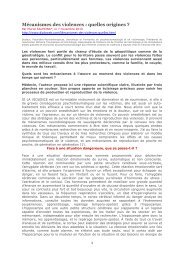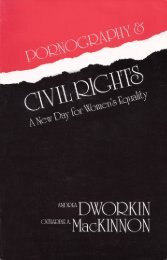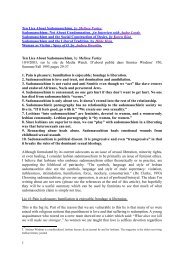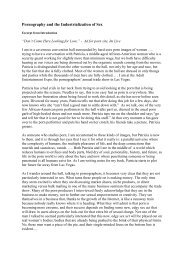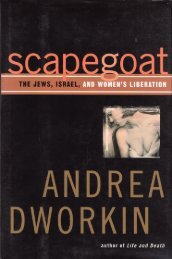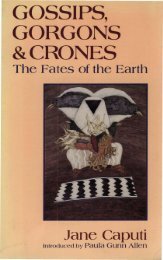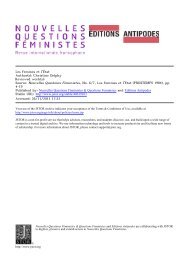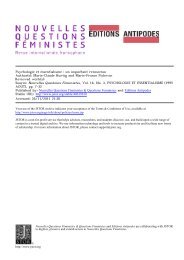12 NOTHING MAT(T)ERSIn The Postmodern Condition: A Report on Knowledge, Jean-François Lyotarddefines postmodernism 12 as an “incredulity toward metanarratives” (1984, p. xxiv)and a resistance to interpretation: “It is necessary to posit the existence <strong>of</strong> a powerthat destabilizes the capacity for explanation” (1984, p. 61). For Lyotard, critique,like alienation, is impossible, out <strong>of</strong> fashion. He takes a position <strong>of</strong> self-regulationwithin his own philosophical meditation, such that he both represents and diagnosespostmodernism: this is the simultaneity <strong>of</strong> the postmodern condition. Lyotard findsthat the major characteristic <strong>of</strong> the postmodern condition, a “historicallyexceptional” event, is its presentation <strong>of</strong> the most complex self-regulation <strong>of</strong> basichuman conditions: “life, death, birth, work, the parity <strong>of</strong> the rich and poor” (1985,p. 12). After curating Les Immatériaux at the Centre Georges Pompidou in 1985,Lyotard defined the postmodern condition again:I shall keep this idea <strong>of</strong> a slow and heavy change equal in length to that <strong>of</strong>modernity; and this particularity <strong>of</strong> technologies to create, in an autonomousfashion, new material materials, new matrices, from their acquired knowledgeand not as a function <strong>of</strong> people’s needs. And I would insist precisely on thefact that this development is searching for its legitimation (1985, p. 14).According to Élie Thé<strong>of</strong>ilakis, editor <strong>of</strong> a collection discussing Lyotard’s LesImmatériaux, modernity is dead, as is the Western promise to humanity <strong>of</strong> thecontrol <strong>of</strong> its destiny through “Knowledge, Emancipation, the Economy, History,”(1985, p. ix). Such hard materials on which to base a modern sensibility no longerexist. Simultaneously, technoscience has relegated the last five thousand years to thehistory <strong>of</strong> the stone age, and humanity as the measure <strong>of</strong> all things is only anostalgia. In fact, “there will never again be any pro<strong>of</strong> <strong>of</strong> our ends, nor pro<strong>of</strong> <strong>of</strong> theend” (1985, p. x). As man/nature is replaced by man/technique, “our” previousknowledge and sensibility is displaced, dematerialized; les immatériaux create usand we are not longer in control. Even the fronti<strong>ers</strong> <strong>of</strong> life and death become fluid,mobile. We are already other, indeed, we are the immaculately conceived! Can wesay then that postmodernism is the philosophy <strong>of</strong> the immaculately deceived? Theundead?Fredric Jameson tends to refer to postmodernist and poststructuralist theoriesinterchangeably, but he distinguishes between these conceptualizations and thepostmodern condition: postmodernism v<strong>ers</strong>us postmodernity. 13 Jameson states thatthere “is a difference between the production <strong>of</strong> ideologies about this reality and thereality itself. They necessarily demand two different responses” (in Stephanson:1989, p. 72). It is Jameson’s view that postmodernity is the cultural logic <strong>of</strong> latecapitalism (1984) (1990). He sees poststructuralist theory as a symptom <strong>of</strong>postmodernist culture (1984, p. 61) but expects that a reconstructed postmodernism12. For a trenchant and thoughtful critique <strong>of</strong> Canadian postmodernism, see Gaile McGregor (1989).Especially useful is her discussion <strong>of</strong> Linda Hutcheon’s work on postmodernism (1988a; 1988b).13. Contrary to Lyotard and Jameson, Scott Lash (1990, p. 4) sees postmodernism as a strictlycultural paradigm, exclusive <strong>of</strong>, although compatible with, the post-industrialist capitalist economy.It is a “regime <strong>of</strong> signification” rather than a “regime <strong>of</strong> accumulation”.
A SPACE ODYSSEY 13will address it (1984, p. 92). Similar to Baudrillard’s urge to reflect to excess adegraded condition, Jameson hopes to “undo postmodernism homeopathically by themethods <strong>of</strong> postmodernism: to work at dissolving the pastiche by using all theinstruments <strong>of</strong> pastiche itself” (in Stephanson, 1989, p. 59). Vincent Descombesdescribes this as Lyotard’s strategy as well:Lyotard consid<strong>ers</strong> it reactionary or reactive to protest against the state <strong>of</strong> theworld, against ‘capitalism’ if we like. There should be no question <strong>of</strong>reproaching capitalism for its cynicism and cruelty: on the contrary, thattendency should be stoked. Capitalism liquidates everything that mankind hadheld to be most noble and holy; such a liquidation must be rendered ‘still moreliquid’ (1979/1988, pp. 181, 182, italics in original).Hassan believes that postmodernism has taken a wrong turn, has become “a kind <strong>of</strong>eclectic raillery” (1987, p. xvii) and he hopes it will instead reach a posthumanismtempered by a pluralist pragmatism. Hassan turns away from the Disneyland wit <strong>of</strong> acertain postmodernism, and calls for renewed “human” values and beliefs: “The timefor sterility is past, grateful as we must remain to the mast<strong>ers</strong> <strong>of</strong> demystification….Without some radiancy, wonder, wisdom, we all risk, in this postmodern clime, tobecome barren” (1987, pp. 229, 230). Thus some postmodernists, sated withDionysian disruption and decreation, call on their old gods for deliverance. Havingdanced the tarantella, postmodernism relegitimates and restabilizes masculinetraditions <strong>of</strong> power and prestige, which are always in a state <strong>of</strong> crisis. The tarantellais a southern Italian ritual dance by women, which lasts several hours, even as longas a day. A wildly passionate, raging and public dance, it exorcises and enacts aferocious female desire for freedom and pleasure. It is an interlude which concludeswith the woman’s reinsertion into the rule and prohibitions <strong>of</strong> masculine culture. Iam suggesting that the postmodernist usurp<strong>ers</strong> <strong>of</strong> “the feminine” are doing a Tootsietarantella and reinscribing their power in transgressing (women’s) boundaries andtheir boundaries around women. 14Let us examine, then, this crisis <strong>of</strong> indifference. Crisis 15 is key to the thought <strong>of</strong>postmodern and poststructuralist man, specifically, the crisis <strong>of</strong> God’s death. Lacanwrites:It is clear that God is dead. That is what Freud expresses throughout his myth—since God came out <strong>of</strong> the fact that the Father is dead, that means to say no14. See Sandra M.Gilbert’s introduction to The Newly Born Woman by Hélène Cixous and CatherineClément (1975/1986).15. From her work on Hispanic modernism in the Americas, Iris Zavala charges poststructuralismwith recycling pluralism and apocalyptic “end <strong>of</strong> ideology” theorizing (1988). “Each ancien has hadits moderne,” (1988, p. 83) she notes, and this particular querelle is unremarkable. “Forecasts, end-<strong>of</strong>time/new-eradiagnoses, futurology, apocalyptic theories and practices—millenarianisms—aboundat the turn <strong>of</strong> the centuries” (Zavala: 1988, p. 83). What she does not note is how the anguish <strong>of</strong>existentialism, the atomic epistemology <strong>of</strong> structuralisms and the catastrophic surges in Foucauldiantime and mind all exhibit signs <strong>of</strong> masculine crisis. J.G.Merquoir asks: “What if the idea <strong>of</strong> a crisis<strong>of</strong> cont. next page
- Page 3: Somer Brodribb teaches feminist the
- Page 6: Spinifex Press Pty Ltd,504 Queensbe
- Page 10 and 11: viiiAnd you get into trouble when y
- Page 12 and 13: xIt is possible to avoid the fate o
- Page 15: Paris, July 14, 1985Dear Mary,Just
- Page 18 and 19: xviH.D. tried to turn the Lord Freu
- Page 20 and 21: xviiiwith and parade a hysterical f
- Page 22 and 23: xxsexual, emotional, political desi
- Page 24 and 25: xxiiAccording to Kristeva, “women
- Page 26 and 27: xxivcharges that political feminism
- Page 28 and 29: xxvisimplistic, words like oppressi
- Page 30 and 31: xxviiiorthodox. In particular, she
- Page 32 and 33: xxxIn the men’s room(s)When I was
- Page 34 and 35: 2 NOTHING MAT(T)ERSthe post-1945, p
- Page 36 and 37: 4 NOTHING MAT(T)ERSWe cannot afford
- Page 38 and 39: 6 NOTHING MAT(T)ERSStructuralism 5
- Page 40 and 41: 8 NOTHING MAT(T)ERSThere is no clea
- Page 42 and 43: 10 NOTHING MAT(T)ERS“Postmodernis
- Page 46 and 47: 14 NOTHING MAT(T)ERSdoubt that we r
- Page 48 and 49: 16 NOTHING MAT(T)ERSmurder which in
- Page 50 and 51: 18 NOTHING MAT(T)ERSmisogyny become
- Page 52 and 53: 20 NOTHING MAT(T)ERS“end of meani
- Page 55 and 56: 2NOTHINGNESS AND DE/GENERATIONSeyto
- Page 57 and 58: NOTHINGNESS AND DE/GENERATION 25is
- Page 59 and 60: NOTHINGNESS AND DE/GENERATION 27tra
- Page 61 and 62: NOTHINGNESS AND DE/GENERATION 29mis
- Page 63 and 64: NOTHINGNESS AND DE/GENERATION 31str
- Page 65 and 66: NOTHINGNESS AND DE/GENERATION 33Bei
- Page 67 and 68: NOTHINGNESS AND DE/GENERATION 35In
- Page 69 and 70: NOTHINGNESS AND DE/GENERATION 37rec
- Page 71 and 72: 3EXISTENCE AND DEATHThe madman jump
- Page 73 and 74: EXISTENCE AND DEATH 41“Man is per
- Page 75 and 76: EXISTENCE AND DEATH 43History has n
- Page 77 and 78: EXISTENCE AND DEATH 45unconscious,
- Page 79 and 80: EXISTENCE AND DEATH 47[M]y main con
- Page 81 and 82: EXISTENCE AND DEATH 49Do the workin
- Page 83 and 84: EXISTENCE AND DEATH 51repudiated hi
- Page 85 and 86: EXISTENCE AND DEATH 53Discourse was
- Page 87 and 88: EXISTENCE AND DEATH 55way for when,
- Page 89 and 90: EXISTENCE AND DEATH 57p. 278). Life
- Page 91 and 92: EXISTENCE AND DEATH 59‘bodies and
- Page 93 and 94: EXISTENCE AND DEATH 61de Sade. I ar
- Page 95 and 96:
EXISTENCE AND DEATH 63an eternal re
- Page 97 and 98:
EXISTENCE AND DEATH 65with bravado
- Page 99 and 100:
EXISTENCE AND DEATH 67accompanies h
- Page 101 and 102:
EXISTENCE AND DEATH 69seek access t
- Page 103 and 104:
4NEUTRALITY AND DE/MEANINGAccording
- Page 105 and 106:
NEUTRALITY AND DE/MEANING 73of the
- Page 107 and 108:
NEUTRALITY AND DE/MEANING 75Derrida
- Page 109 and 110:
NEUTRALITY AND DE/MEANING 77Animali
- Page 111 and 112:
NEUTRALITY AND DE/MEANING 79belongs
- Page 113 and 114:
NEUTRALITY AND DE/MEANING 81origin
- Page 115 and 116:
NEUTRALITY AND DE/MEANING 83women,
- Page 117 and 118:
NEUTRALITY AND DE/MEANING 85The ess
- Page 119 and 120:
NEUTRALITY AND DE/MEANING 87laughte
- Page 121 and 122:
5LACAN AND IRIGARAY: ETHICALLACK AN
- Page 123 and 124:
LACAN AND IRIGARAY: ETHICAL LACK AN
- Page 125 and 126:
LACAN AND IRIGARAY: ETHICAL LACK AN
- Page 127 and 128:
LACAN AND IRIGARAY: ETHICAL LACK AN
- Page 129 and 130:
LACAN AND IRIGARAY: ETHICAL LACK AN
- Page 131 and 132:
LACAN AND IRIGARAY: ETHICAL LACK AN
- Page 133 and 134:
LACAN AND IRIGARAY: ETHICAL LACK AN
- Page 135 and 136:
LACAN AND IRIGARAY: ETHICAL LACK AN
- Page 137 and 138:
LACAN AND IRIGARAY: ETHICAL LACK AN
- Page 139 and 140:
LACAN AND IRIGARAY: ETHICAL LACK AN
- Page 141 and 142:
LACAN AND IRIGARAY: ETHICAL LACK AN
- Page 143 and 144:
LACAN AND IRIGARAY: ETHICAL LACK AN
- Page 145 and 146:
LACAN AND IRIGARAY: ETHICAL LACK AN
- Page 147 and 148:
LACAN AND IRIGARAY: ETHICAL LACK AN
- Page 149 and 150:
LACAN AND IRIGARAY: ETHICAL LACK AN
- Page 151 and 152:
6OUT OF OBLIVIONPhilosophy, both id
- Page 153 and 154:
OUT OF OBLIVION 121whose call to th
- Page 155 and 156:
OUT OF OBLIVION 123Figure 1: Egypti
- Page 157 and 158:
OUT OF OBLIVION 125Figure 3: Materi
- Page 159 and 160:
OUT OF OBLIVION 127life and death,
- Page 161 and 162:
OUT OF OBLIVION 129unsettle and soo
- Page 163 and 164:
OUT OF OBLIVION 131Lacan has gone b
- Page 165 and 166:
OUT OF OBLIVION 133(1989, p. 27-28)
- Page 167 and 168:
OUT OF OBLIVION 135in the social re
- Page 169 and 170:
OUT OF OBLIVION 137that anyone can
- Page 171 and 172:
OUT OF OBLIVION 139Figure 5: Kylix
- Page 173 and 174:
OUT OF OBLIVION 141lover, Ariadne,
- Page 175 and 176:
OUT OF OBLIVION 143neutralized and
- Page 177 and 178:
OUT OF OBLIVION 145But Deconstructo
- Page 179:
OUT OF OBLIVION 147recurrent Same.
- Page 182 and 183:
150 NOTHING MAT(T)ERSBarry, Kathlee
- Page 184 and 185:
152 NOTHING MAT(T)ERSCanguilhem, Ge
- Page 186 and 187:
154 NOTHING MAT(T)ERSDerrida, Jacqu
- Page 188 and 189:
156 NOTHING MAT(T)ERSEagleton, Terr
- Page 190 and 191:
158 NOTHING MAT(T)ERSFreud, Sigmund
- Page 192 and 193:
160 NOTHING MAT(T)ERShooks, bell. (
- Page 194 and 195:
162 NOTHING MAT(T)ERSJones, Ann Ros
- Page 196 and 197:
164 NOTHING MAT(T)ERSReality: Femin
- Page 198 and 199:
166 NOTHING MAT(T)ERSMegill, Allan.
- Page 200 and 201:
168 NOTHING MAT(T)ERSPatai, Daphne.
- Page 202 and 203:
170 NOTHING MAT(T)ERSSade, Donatien
- Page 204 and 205:
172 NOTHING MAT(T)ERSThompson, Deni
- Page 206 and 207:
174 NOTHING MAT(T)ERSby Carolyn Bur
- Page 208 and 209:
176 NOTHING MAT(T)ERSDionysus (Bacc
- Page 210:
178 NOTHING MAT(T)ERSPoovey, Mary,



